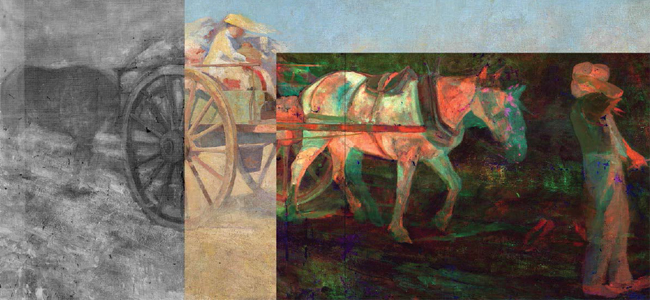Pictured: A standard radiograph of The North wind (left) shows touched-up areas of the painting as dark patches, of interest to conservators; in the centre, the pre-restoration painting as viewed by the naked eye (centre); the image on the lower right shows the power of the Australian Synchrotron’s X-Ray Fluoresence Microscopy (XFM) beamline in revealing colour-coded detail of the metal composition of paint layers.
Following an intensive, year-long conservation project, one of Australia’s foremost Impressionist artists Frederick McCubbin will be seen in a new light as his painting, The North wind, c1888, returns to public display at NGV Australia today.
Working with the Australian Synchrotron and utilising its ability to produce light a million times brighter than the sun and record the X-ray fluorescence emitted, NGV researchers have imaged the pigments buried within the many layers of paint to reveal the painting’s secret history, no longer visible on the surface.
Images produced by the Australian Synchrotron’s X-Ray Fluorescence Microscopy (XFM) beamline revealed a lush and green landscape composition later replaced by McCubbin in favour of an arid landscape, a change suspected to have been made amid the centenary of settlement commemorations in 1888 and the emergent idea of the ‘Aussie battler’.
The high resolution images also confirmed the signature and much-speculated 1891 date depicted on the painting were added erroneously after early restoration attempts saw the painting cropped and the original signature and date removed. Analysis at the Australian Synchrotron showed the use of materials in The North wind is consistent with McCubbin’s work in the late 1880s and indicates the painting was most likely begun between 1887 and 1888.
Professor Andrew Peele, Director of the Australian Synchrotron says pixel-by-pixel scanning on the XFM beamline guided the restorative work of NGV conservators.
‘While the naked eye can differentiate between colours, and a standard X-Ray reveals further information about the depth and shape of the paint, only the powerful light of the synchrotron beam can colour-code and map the distribution of metals such as zinc, lead and iron in the pigment, enabling conservators to identify and remove touch-ups from the original.
‘As a national facility, the Australian Synchrotron is proud to improve understanding and contribute to the conservation of our collective cultural heritage.’
Tony Elwood, Director, NGV says the NGV’s conservation department is responsible for the care and restoration of more than 70,000 works of art.
‘Our conservators have partnered with scientists at the Australian Synchrotron to advance the use of state of the art imaging technology in the visual arts and created new research methods for art historians and conservators.’
Prior to entering the NGV’s collection in 1941 The North wind was subjected to significant restorations that altered the presentation of the artist’s original work, including a failed attempt to clean its surface, followed by considerable over-painting of McCubbin’s original composition. There was also evidence to suggest that the format of the picture has been modified and the original frame removed.
From today, a new interactive e-book will be on display at NGV Australia detailing the restoration process of McCubbin’s The North wind through interviews, text, images and videos. This display will be a new permanent feature of NGV Australia and showcase works from the NGV collection that have undergone conservation research.
Find out more:
Hear Dr Daryl Howard, Scientist on the XFM beamline describe how the Australian Synchrotron team helped NGV conservators restore The North wind, in an interview with Michael Varcoe-Cocks, Head of Conservation, NGV. Play video below.
Read the full story of The North wind’s journey back to glory in NGV Australia’s extensive e-book, produced with the support of the Bank of America Merrill Lynch Art Conservation Project. Click to view e-book >
Media coverage:
‘High-res imaging reveals Fred McCubbin's true painting’, Australian Financial Review, Thursday 3 December 2015.
‘Australian Synchrotron used to analyse pigments to restore Frederick McCubbin's The North Wind’, Sydney Morning Herald online, Tuesday 15 December 2015.

